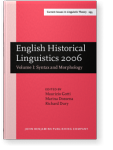The Old English copula weorðan and its replacement in Middle English
 Peter Petré | Fund for Scientific Research-Flanders & University of Leuven
Peter Petré | Fund for Scientific Research-Flanders & University of Leuven
With the aid of a specially compiled corpus, this paper accounts for the replacement – mainly by become – of weorðan ‘become’, whose use rapidly decreased in Middle English. Drawing on Goldbergian construction grammar, the paper posits the existence of a lexeme-independent network of copular constructions [Copula + np/ap/…]. Copular uses of weorðan are associated with this network, but also form part of a second network exclusive to weorðan, which, already in Old English, served as a model for the extension of becuman to copular uses. In early Middle English, weorðan reacted to changes in the lexeme-independent copular network. Weorðan was no longer used with adjectival participles when these were constructionally separated from its most frequent collocates, namely human propensity adjectives. Furthermore, reacting to an influx of various adjectives in predicate position, becuman, which had no collocational preferences, extended its use to these adjectives and eventually took over from weorðan completely.
Cited by (2)
Cited by two other publications
Van Wettere, Niek & Peter Lauwers
2017.
La micro-constructionnalisation en tandem : la copularisation de tourner et virer.
Langue française N° 194:2
► pp. 85 ff.

PETRÉ, PETER
2010.
The functions ofweorðanand its loss in the past tense in Old and Middle English.
English Language and Linguistics 14:3
► pp. 457 ff.

This list is based on CrossRef data as of 11 july 2024. Please note that it may not be complete. Sources presented here have been supplied by the respective publishers.
Any errors therein should be reported to them.
